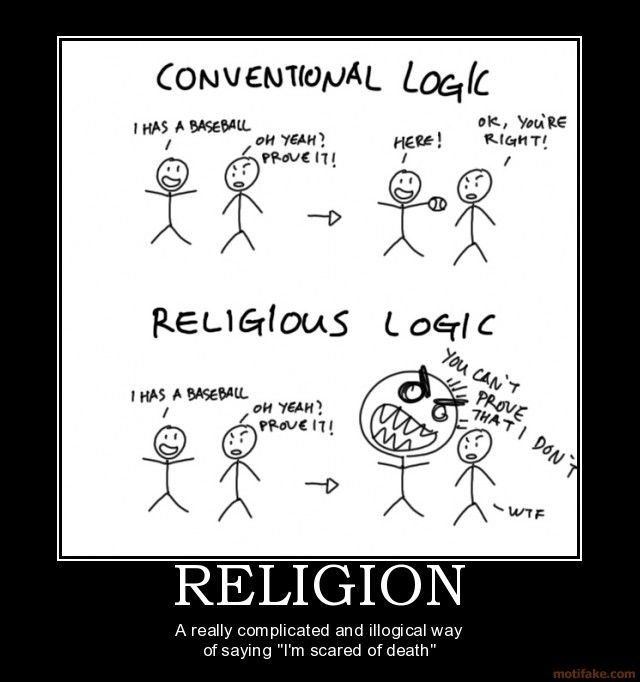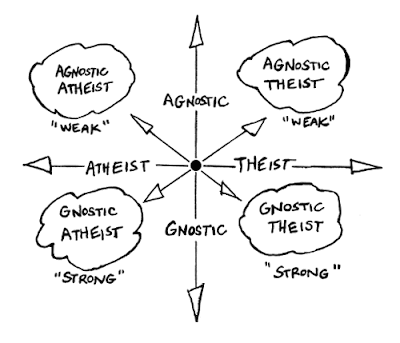Reversing the Burden of Proof: Why Apologists Continue to Do it (Excerpt from Chapter 9: Surviving the Fallout After a Nuclear Face-Palm)
Continuing on, Sheridan laments that it’s unfair of theists to expect atheists to disprove God, since one cannot prove a negative. Randal answers his complaint by informing:
I hear that claim from atheists a lot these days, but it’s just not true. You certainly can prove that something doesn’t exist. The strongest way would be by showing that the concept of the entity in question is incoherent, because if something is incoherent then it can’t exist.
I’m glad Randal acknowledges as much since, in my book Ignosticism: A Philosophical Justification for Atheism, I make the case that “God” is an incoherent concept, for numerous reasons, least of all that nobody, not even believers, can seem to agree on a single coherent definition for God. Instead, they all offer competing definitions, many of which outright negate one another. For example, Unitarian Universalists reject the triune God of mainstream Christian theology meanwhile Catholics and Protestants believe in a trinity as a defining characteristic of God. So which is it, is God comprised of a trinity or not. He can’t be both. But both is what Christians have been claiming, thus God is an incoherent concept.
Likewise, Lutherans believe, via the doctrine of Justification, that God has forgiven all sins and so everyone is saved whereas Calvinists believe in the doctrine of Predestination whereby God predestines people to an eternity in Hell before they’re even born, even if they truly believe and have been forgiven. So which of these God definitions is it, is God a forgiving God or not? He cannot be both. Being both an all forgiving God and a God who predestines people to Hell in an unforgiving manner is contradictory, thus renders the definitions of the Christian God incoherent.
As you can clearly see, any definition which negates its own meaning is not exactly coherent. You almost have to wonder what Christians are trying to describe exactly or, more likely, if they’re just making it all up as they go along.
Randal follows this with the extremely peculiar claim that
The skeptic cannot plausibly dismiss these beliefs as being unfalsifiable. But then if these beliefs are in principle falsifiable, then the skeptic has an evidential burden to show that they are, in fact, false. He can’t simply dismiss the task as a fool’s errand. Atheists don’t get to dismiss their cake and eat it, too.
I can imagine Christians nodding along with this reasoning, not realizing how faulty it is. You see, this boils down to the “I have a Magic Baseball™” argument.
If I told you, for example, that I had a Magic Baseball™ that could grant you three wishes, would the burden really be on you to disprove my magic baseball claim when I haven’t provided you any proof? No, of course not! Because you’re not the one making the claim to have a Magic Baseball™. The burden is on the person who makes the claim. Having to disprove everyone else’s unfounded claims, after all, is not reasonable.
Randal is simply wrong here. It doesn’t seem very likely that God is a null hypothesis waiting to be proved false by evidence, otherwise someone would have certainly done so by now. On the other hand, not having done so doesn’t automatically validate God as existent. The primary reason nobody has falsified the existence of God is because there simply is no evidence to consider, hence nothing to disprove, and it is not rational to attempt to disprove that which does not exist.
Yet this is exactly why Randal wants you to take up the challenge, because he knows full well that it is a futile endeavor, and being unable to meet the evidential burden of proof you will have no choice but to concede to the fact that Randal is right and that God, at the very least, probably exists.
This is the disreputable sleight of hand of the apologist. Those pesky atheists, you see, they don’t automatically accept our Magic Baseball™ as a fact, so we’re gonna trick them into trying to disprove it!
“You can’t prove that I don’t not have a Magic Baseball™! Bwah-Hahahaha!”
This is what is called shifting the burden of the proof. It’s a cheap trick, and probably the most popular in the apologist’s bag of tricks. Be on the lookout for it. I have to admit, I’m a little disappointed that Randal resorts to it in his book, let alone doesn’t try to hide what is essentially a non-argument. Reversing the burden of proof doesn’t automatically justify or validate your position.
Perhaps an easier way to reveal the trick is to simply ask them to produce what they claim is existent. Unable to produce their Magic Baseball™ then they will have technically falsified their own claim to be in possession of a magic baseball.
So, when a theist asks you to disprove God, just remind them as a skeptic and an atheist you don’t believe in any God, and would like them to simply produce what they say exists so you can see it for yourself. Should be easy for them, if God truly exists.
If they resort to apologetic maneuvers however, such as playing semantics games of redefining God to something not quite extant but something intangible, imperceptible, transcendent, existing outside of space and time … well, then they have made their own definition of God incoherent.
They are essentially saying God transcends reality and that there is no evidence for such a God, but that he exists nonetheless. It’s a contradiction in terms. It’s like talking about Invisible Pink Unicorns (or IPUs for short). No such thing can exist, because it’s logically impossible to be an opaque color when you’re completely transparent. A God which interacts with reality in any capacity at any level will leave evidential footprints, so to speak. Accounting for the lack of footprints by saying God exists beyond reality is only a way to try to salvage God belief despite an incontestable lack of evidences to support the claims of believers.
Of course, the apologist could simply stick to theological demonstrations and try to convince us that we can know God through reason, or some such similar argumentation, but this is all after the fact. The only realization we need to make here is that they failed to demonstrate the existence of what they claim exists. Systems which fail to demonstrate their claims are almost, assuredly, always false.
Next Randal and Sheridan discuss Antony Flew’s invisible gardener for a few minutes. When Sheridan says that it sounds like God belief to him, Randal objects, affirming:
If you assume a set of definitional claims about God, like his triune identity and a particular set of attributes, then your belief is not a mere cipher. It has real content and can be falsified.
This is very true. And many of these beliefs can be easily falsified. Triune god concepts can be shown inconsistent, incoherent, and not actually Biblically supported. Ask any Unitarian Universalist Christian. Many other attributes can be proved ostensible, which is why in my book Ignosticism I have a chapter devoted to discussing ostensible attributes. In my book I raise the point that attributes are ascribed, not derived.
Having an already established definition for what God means, according to one’s cultural experiences, sounds perfectly fine when everyone shares a like-minded belief. Many Catholics preach God is love, because that’s what Catholics believe. But asking the question “Is God love?” forces us to come to a realization that the term “love” has merely been ascribed to God, not derived from God. Christian theology supplies the definition, not from the study of God, but from what the Holy Bible says about God. So already we have a cultural and religious worldview providing the believer with a specific definition of God, in this case, that God is love.[1]
The problem as I see it is that naming God a “Loving God” isn’t the same as describing that entity as loving. Naming and describing are two very different things.
Now, all it seems to me the religious person is capable of doing is ascribing names, i.e. assumed attributes, to their idea of God. Contrary to what Randal may espouse, this isn’t exactly reliable information and we cannot always falsify it because we often do not have any way to examine the actual thing itself (God), which we’d need to in order to derive a correct description which would either thereby validate or falsify one’s chosen attributes for God.
If the attribute named and the description as derived matched, and we witnessed the thing itself being loving, then naming it a “loving” thing would be the correct thing to do. But if the thing itself is nowhere to be found and cannot be tested or observed, how can we deduce that it has a loving nature or acts in accordance to what we call love? We can’t falsify that claim, because it’s mainly a claim about imaginary nothings until we can examine the thing itself and see for ourselves whether or not there is something more to it all.[2]
At any rate, that’s the problem which believers need to overcome with regard to ostensible attributes.
Continuing on, Sheridan changes the subject and states:
The fact is that the Christianity of today shares no substantial identity with the Christianity of medieval Europe or the Roman Empire, not to mention the Jewish religion of the Old Testament.
Randal disagrees, however, and informs, “I think you’re focusing on non-essential changes.”
But not really. Christianity has changed quite substantially over the course of history. So much so that past Christians would not likely be able to recognize modern forms Christianity as anything but heretical, malformed, distortions of their faith. What would St. Augustine think of mega pastor Joel Olsteen for example? Or, for that matter, what would St. Thomas Aquinas think of Pat Robertson? What would John Calvin think of mega rich mega pastor Rick Warren? Although it’s just a hunch, I highly doubt the Christian thinkers of the past would consider the Christian “thinkers” of today genuine Christians.
I don’t even know why Randal would feel compelled to deny this, but he does. He goes on to say Christians share an underlying unity in the conviction that God sent his Son to offer a fallen world the way to reconciliation.
Well, yes, this goes without saying as it is simply a declaration of what the shared theological conviction of most Christians is. But I am less interested in proclamations of faith than I am simple, down to earth demonstrations and it seems Randal has none.
[1] Tristan Vick, Ignosticism: A Philosophical Justification for Atheism, p. 34
[2] A thing’s systematic relationship with reality matters. Metaphysics falls away in favor of finding real links between the thing itself and the thing as we experience it. This is made clear in A.J. Ayer’s seminal work Language, Truth, & Logic.



Comments
Post a Comment